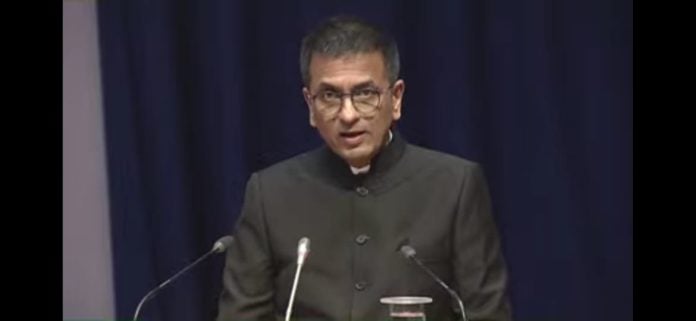Chief Justice of India (CJI) D.Y. Chandrachud on Saturday appealed to the citizens that they should breathe life into the constitutional values and practice them in the same way as they obey and practice the laws of the country.
Speaking during the celebration of Constitution Day at the Supreme Court premises, the CJI said that the ideas of liberty, equality and fraternity should be practised in everyday lives by all citizens.
Speaking about the Constitution, he said India was one of the very few nations, where the Constitution was written by her own people.
“Unlike other countries which gained independence during that time, we forged our own Constitution, in the flames of ardent hope for a bright future.”
He further said that the critics may say that the Indian Constitution has not been written as much as it has been borrowed, but that does not detract the citizens from the fact that the country’s Constitution was uniquely Indian. The framers modified the provisions to suit the Indian context and polity, he added.
“The only relic of our colonial past is when the lawyers begin the address with “My Lord” in the court. Thereafter what follows is truly Indian style of advocacy largely in Hindi, interspersed with little English and some Latin phrases. This was especially true when I was the Chief Justice at the Allahabad High Court,” added the CJI.
He said that today, it cannot be said that the Constitution has achieved all that it was set to do since the Constitutional values were also practiced every moment, adding that the Constitution evolved with the society.
The CJI said the Constituent Assembly had a very important aim. The framers had to ensure that national unity prevailed.
As per Justice Chandrachud, “Our Constitution manages to achieve unity in diversity. It does not force its citizens to choose between their rights and culture. This is the principle of accommodation, which is the ability to simultaneously apply principles, which seem to be in conflict with one another, but it is different from compromise, as it includes concessions.”
He said the Supreme Court was in the process of establishing vulnerable witness deposition centers to courts across jurisdiction and enabling paperless courts, adding that the Apex Court recently inaugurated the online RTI portal to streamline the process of transparency. ” We are working closely with the High Courts of the country. I hope we can continue these dialogues in the future so that our association with the Chief Justices and Judges of the High Courts, along with the District Judiciary is not that of superiority, but of equals,” he added.


